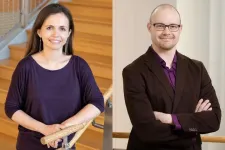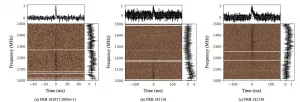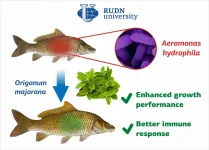(Press-News.org) AMES, Iowa - Parents would never give their children the keys to the car without supervised training and driver's education. An Iowa State University researcher says parents and educators need to take a similar approach before handing children a keyboard to access the digital world.
ISU psychology professor Douglas Gentile worked with the DQ (Digital Intelligence) Institute, an international think tank, to design a framework for digital literacy education. In a commentary, published by the journal Nature Human Behaviour, Gentile and his colleagues outlined how the COVID-19 pandemic has accelerated the need to implement this global standard for digital literacy.
"Children are exposed to various risks online, and COVID increases the odds because now they're online more than ever," Gentile said. "If children haven't had the training to know what to look out for, they're perhaps subject to more risks."
Gentile and colleagues Joshua Jackman, assistant professor with Sungkyunkwan University in South Korea; Nam-Joon Cho, professor with Nanyang Technological University in Singapore; and Yuhyun Park, founder of the DQ Institute, examined the responses of more than 145,000 children and adolescents from 30 countries, finding that 60% were exposed to cyber risks such as cyberbullying, gaming disorder and violence. Gentile says the results show this is a universal problem that needs a global solution.
Despite extensive efforts to create digital skills programming, the researchers wrote that the impact has been limited because a common framework did not exist and there was weak coordination between programs. In response, the Institute of Electrical and Electronics Engineers (IEEE) Standards Association last fall approved the DQ framework as the standard for digital education. The DQ framework focuses on digital skills education across eight competencies, including identity, use, safety, security, emotional intelligence, literacy, communication and rights.
Gentile says approval of the framework is just a first step toward getting digital literacy education in K-12 classrooms. He says it is imperative that students have the tools to become savvy digital consumers, especially with the growing number of risks and misinformation online.
"If anyone can post information online, whether it's true or false, we need to give consumers the skills to detect it and guard against it," Gentile said. "Digital literacy will not eliminate the risks online, but it will develop good digital citizens who have the skills to work within the system so they can gain the benefits, without the harms that the risks might pose."
1 Billion Digital Skills Project
Gentile and his colleagues are calling on academic researchers, educators and others to join the efforts of the Coalition for Digital Intelligence (see sidebar for partners) to support the 1 Billion Digital Skills Project. As the name suggests, the project aims to equip one billion people, primarily K-12 students, teachers and parents, with digital skills within 10 years. The coalition is working to achieve the following objectives:
Build a global network to develop/implement digital skills education and training.
Develop a certification system to evaluate digital skills programs.
Develop microbadge credits students can earn to incentivize learning.
Create an online assessment platform to measure digital skills.
Support ongoing improvement of DQ standards and evaluation of educational programs.
Gentile says achieving these objectives will require state and federal investment to train K-12 teachers and provide programming in schools. The return on the investment is twofold, he said. The training will not only protect children from online risks, but help prepare the future workforce.
"More and more jobs include an online component," Gentile said. "If we train people to be good digital citizens, we'd likely have fewer breaches in corporate America. There is a financial incentive to put resources into our schools to provide this training."
Coalition for Digital Intelligence
The Coalition for Digital Intelligence is working to implement the digital intelligence framework across the technology and education sectors, making sure that both work together toward universal digital intelligence. Coalition partners include:
DQ Institute
Organisation for Economic Cooperation and Development (OECD)
IEEE Standards Association
World Economic Forum
INFORMATION:
What do you do after solving the answer to life, the universe, and everything? If you're mathematicians Drew Sutherland and Andy Booker, you go for the harder problem.
In 2019, Booker, at the University of Bristol, and Sutherland, principal research scientist at MIT, were the first to find the answer to 42. The number has pop culture significance as the fictional answer to "the ultimate question of life, the universe, and everything," as Douglas Adams famously penned in his novel "The Hitchhiker's Guide to the Galaxy." The question that begets 42, at least in the ...
CHAMPAIGN, Ill. -- Charitable donations account for about 2% of gross domestic product in the U.S., but it's not well-understood whether an event such as a deadly storm inspires increases in charitable giving or simply reallocates a fixed supply of donation dollars that would have otherwise gone to another cause.
A new paper from a team of University of Illinois Urbana-Champaign experts finds that, in the aftermath of catastrophic tornadoes, charitable giving to alleviate an unanticipated event doesn't necessarily crowd out monetary donations to ...
Millions of people die prematurely every year from diseases and cancer caused by air pollution. The first line of defence against this carnage is ambient air quality standards. Yet, according to researchers from McGill University, over half of the world's population lives without the protection of adequate air quality standards.
Air pollution varies greatly in different parts of the world. But what about the primary weapons against it? To find answers, researchers from McGill University set out to investigate global air quality standards in a study published ...
The idea was so far-fetched it seemed like science fiction: create an observatory out of a one cubic kilometer block of ice in Antarctica to track ghostly particles called neutrinos that pass through the Earth. But speaking to Benedickt Riedel, global computing manager at the IceCube Neutrino Observatory, it makes perfect sense.
"Constructing a comparable observatory anywhere else would be astronomically expensive," Riedel explained. "Antarctica ice is a great optical material and allows us to sense neutrinos as nowhere else."
Neutrinos are neutral subatomic particles with a mass close to zero that can pass through solid materials at near the speed of light, rarely reacting with normal matter. They were first detected in the 1950s in experiments that operated ...
Scientists using NASA's Hubble Space Telescope have found evidence that a planet orbiting a distant star may have lost its atmosphere but gained a second one through volcanic activity.
The planet, GJ 1132 b, is hypothesized to have begun as a gaseous world with a thick hydrogen blanket of atmosphere. Starting out at several times the diameter of Earth, this so-called "sub-Neptune" is believed to have quickly lost its primordial hydrogen and helium atmosphere due to the intense radiation of the hot, young star it orbits. In a short period of time, such a planet would be stripped down to a bare core about the size of Earth. That's when things got interesting.
To the surprise of astronomers, Hubble observed an ...
ROCHESTER, Minn. -- Ten days after receiving a second dose of a messenger RNA, or mRNA, vaccine for COVID-19, patients without COVID-19 symptoms are far less likely to test positive and unknowingly spread COVID-19, compared to patients who have not been vaccinated for COVID-19. The Pfizer-BioNTech and Moderna messenger RNA vaccines for COVID-19 are authorized for emergency use in the U.S.
With two doses of a messenger RNA COVID-19 vaccine, people with no symptoms showed an 80% lower adjusted risk of testing positive for COVID-19 after their last dose. Those are the findings of a Mayo Clinic study of vaccinated patients. These finding appear in the journal Clinical Infectious Diseases.
The authors say these findings underscore ...
A study conducted by researchers at the University of Rochester Medical Center (URMC) - in collaboration with several other universities - indicates that breastfeeding women with COVID-19 do not transmit the SARS-CoV-2 virus through their milk, but do confer milk-borne antibodies that are able to neutralize the virus.
The study, "Characterization of SARS-CoV-2 RNA, antibodies, and neutralizing capacity in milk produced by women with COVID-19," published on February 9 in the journal mBio - analyzed 37 milk samples submitted by 18 women diagnosed with COVID-19. None of the milk samples were found to contain ...
Fast radio burst (FRB) is a kind of mysterious radio flashes lasting only a few thousandths of a second. Confirmed to be the cosmological origin in 2016, FRB has the potential to provide insights into a wide range of astrophysical problems.
Dr. NIU Chenhui from the team led by Dr. LI Di and Dr. ZHU Weiwei from National Astronomical Observatories of Chinese Academy of Sciences discovered three new FRBs with high dispersion measure from the massive data of the Five-hundred-meter Aperture Spherical radio Telescope (FAST).
Their findings were published in The Astrophysical Journal Letters on March 3.
The discovery indicated that these three FRBs happened billions of years ago when the ...
Intrauterine growth restriction (IUGR) is common and concerning, but few therapeutic options exist for pregnant mothers who receive this diagnosis. IUGR is a condition in which a baby in the womb is measuring small for its gestational age, often because of issues with the placenta, resulting in compromised or insufficient transfer of oxygen and nutrients to the growing fetus. The developing fetal brain is particularly vulnerable to these effects. One out of every 10 babies is diagnosed with IUGR, and infants with IUGR are at increased risk of death and neurodevelopmental impairment. ...
Biologists from RUDN University suggested adding a marjoram-based supplement to the diet of common carp to support the growth of the fish and improve their resistance to bacterial infections. The results of the study were published in the Fish & Shellfish Immunology journal.
Cyprinus carpio is a type of large omnivore fish that grows 35-40 cm long in three to five years. 4 mln tons of carps were bred in aquacultural farms in 2010. Such farms protect natural populations of Cyprinus carpio while at the same time satisfying the market demand. However, as farmers strive for higher productivity, aquacultural farms become more and more crowded which leads to the lack of nutrients and harms the health of the fish. A team of veterinarians ...




